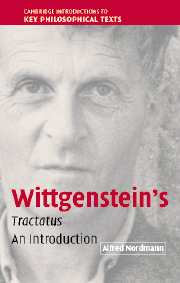Book contents
- Frontmatter
- Contents
- Preface
- List of abbreviations of works by Wittgenstein
- Introduction: Wittgenstein's provocation
- 1 Critical philosophy
- 2 The argument
- 3 Thought experiments
- 4 Tense and mood
- 5 The senses of sense
- Conclusion: a sense of familiarity
- References
- Index of names and subjects
- Index of passages
Conclusion: a sense of familiarity
Published online by Cambridge University Press: 03 February 2010
- Frontmatter
- Contents
- Preface
- List of abbreviations of works by Wittgenstein
- Introduction: Wittgenstein's provocation
- 1 Critical philosophy
- 2 The argument
- 3 Thought experiments
- 4 Tense and mood
- 5 The senses of sense
- Conclusion: a sense of familiarity
- References
- Index of names and subjects
- Index of passages
Summary
“The sense of the book is an ethical one,” Wittgenstein wrote to Ludwig von Ficker, and suggested that because of this, the subject matter of the Tractatus “isn't foreign to you.” This book about the Tractatus began with a statement of “Wittgenstein's provocation” and has gradually revealed that his is not the kind of provocation that aims to shock and offend, but rather is one that literally provokes us to engage in a particular thought experiment. Indeed, an understanding of Wittgenstein depends on our willingness to support and sustain his movement of thought, to appreciate and endorse his commitments. Now, this dependency is familiar to every reader of the Tractatus. After ascending Wittgenstein's ladder, we no longer find it outlandish but very ordinary that Wittgenstein cannot rely on the sentences themselves to convey sense in virtue of their content, but that he must rely on the imaginative activity of his readers. By way of conclusion, I would like to emphasize just how familiar we are with Wittgenstein's predicament.
FEARFUL EXPECTATIONS
Wittgenstein's critics have been asking a question that appears to express bewilderment but that really is not a question at all in that it answers itself: if one writes nonsense, how can one hope to be understood?
This question answers itself by invoking a distinction that is fundamental to the critical philosophy of Kant and his various successors: if one writes nonsense, one can only hope and cannot expect to be understood.
- Type
- Chapter
- Information
- Wittgenstein's TractatusAn Introduction, pp. 203 - 217Publisher: Cambridge University PressPrint publication year: 2005



